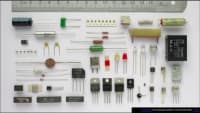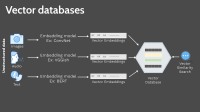
Electrical Circuit Design for Embedded Systems
Gain proficiency of understanding and building basic electrical circuits.
1 h 46 m

ARM Cortex-M : Modular Embedded Systems Design (FREE!)
Create an autonomous robot using a System Approach, Assembly, and Bare Metal Embedded-C.
7 h 35 m

Legacy Embedded Systems
Cutting-edge transformation of Embedded Systems, System Design Flow, and Legacy Embedded Systems. Learn how to become an Embedded Engineer.
1 h 51 m

Master Class on Embedded C Programming-DAY 1/30
The Objective of this Webinar Series is to facilitate the participants to Learn the Fundamentals of C Language.

Learn Embeddings and Vector Databases
Implementing Retrieval-augmented Generation (RAG) with embeddings and a vector database can help increase the accuracy and reliability of LLM-based programs.
1 h 34 m
Subjects
Why Choose Free Embedded Systems Courses?
Free embedded systems courses offer an excellent opportunity to dive into the world of hardware programming, microcontrollers, and real-time systems. With no financial commitment, you can explore core topics like embedded C programming, IoT integration, and ARM processors. Whether you're just starting or looking to refine your skills, these courses offer flexible learning that fits into your schedule, making them ideal for both beginners and seasoned professionals.
Top Platforms Offering Free Embedded Systems Courses
Some of the best platforms offering free embedded systems courses include Coursera, edX, and Udemy. These platforms host tutorials on embedded systems, real-time systems, and microcontrollers, helping learners gain practical experience and certification in embedded design and development.
Benefits of Learning Embedded Systems Online
Online courses provide the flexibility to learn at your own pace. You can access comprehensive learning materials, project-based tutorials, and expert-led video lessons. Additionally, these courses enable you to practice your skills with hands-on projects and real-world case studies, making them highly beneficial for career development in embedded systems and related fields.
How to Get Started
To get started, sign up for a course on any of the major learning platforms. Many platforms offer a free trial or completely free access to the course content. Make sure to review the prerequisites and suggested resources to maximize your learning experience.
FAQs
1. What are embedded systems, and why are they important?
Embedded systems are specialized computing systems designed to perform dedicated functions within a larger system. They are crucial for devices like smartphones, medical equipment, and automobiles, where real-time processing and high reliability are needed.
2. What skills will I learn from an embedded systems course?
You will learn essential programming skills in languages like C, design techniques for microcontrollers, and methods for building real-time systems. You will also explore embedded systems in IoT applications and ARM processor architectures.
3. Do I need prior knowledge of programming to start learning?
While prior programming experience can be helpful, many free embedded systems courses are designed for beginners. You will start with basic concepts and progress to more complex topics like embedded C programming.
4. How long does it take to complete a free embedded systems course?
The time required varies by course, but most beginner courses can be completed in a few weeks, while more advanced courses may take longer depending on the depth of the content and your learning pace.
5. Are these free courses sufficient for a career in embedded systems?
These free courses provide foundational knowledge and practical skills that are valuable for entry-level roles in embedded systems. For more advanced positions, you may need to pursue additional certification or formal education.
6. What programming languages are essential for embedded systems?
Embedded systems commonly use programming languages like C, C++, and Python. Learning embedded C is particularly important for microcontroller programming, which is central to many embedded systems applications.
⏱️ Learning takes time ✨ AI makes it faster
Discount Offers
 Get 50% off on Skillshare Monthly or Annual plan
Get 50% off on Skillshare Monthly or Annual plan  Domestika courses upto 70% off . Extra 10% off with coupon: COURSESITY
Domestika courses upto 70% off . Extra 10% off with coupon: COURSESITY  Get upto 80% off on Udemy
Get upto 80% off on Udemy 50% off on DataCamp for everything
50% off on DataCamp for everything  Save with 50% off on all courses Udacity
Save with 50% off on all courses Udacity  50% off Pro & Student-Annual on Codecademy
50% off Pro & Student-Annual on Codecademy  $1 for the first month of Coursera Plus Monthly
$1 for the first month of Coursera Plus Monthly  Upto 15% discount on Educative coding courses
Upto 15% discount on Educative coding courses  Buy 1 membership, gift 1 Free for Masterclass
Buy 1 membership, gift 1 Free for Masterclass
